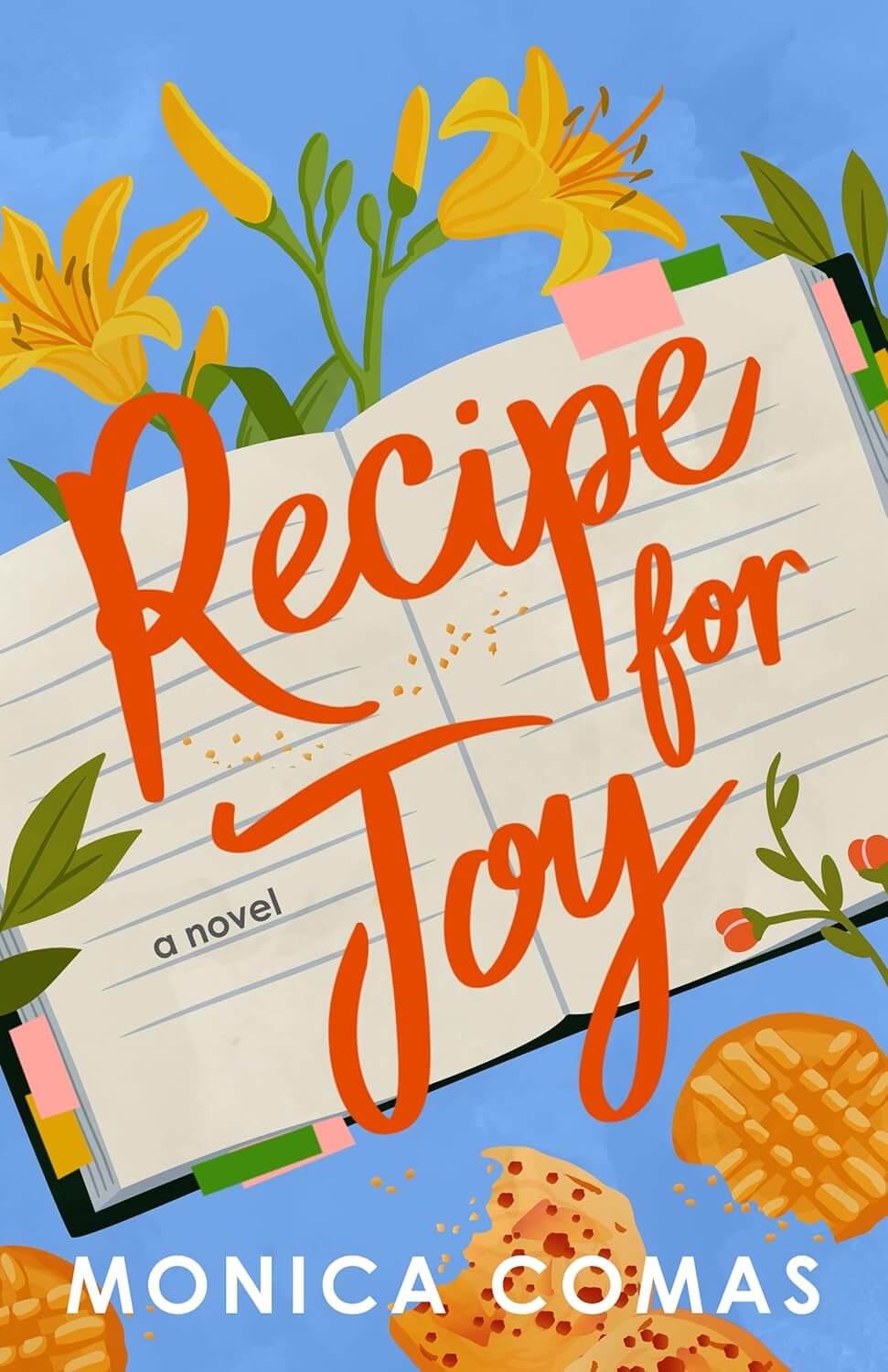Nothing goes together better than books and food. In this Spring 2026 release, a woman tries to navigate hardship in her life with the help of a late loved one and a cookbook. Dive into this first look at a delicious debut novel hitting the shelves next March. And enjoy this exclusive partial excerpt of the first chapter of Recipe for Joy by Monica Comas.

Recipe for Joy by Monica Comas
Belle Sutton’s life isn’t going according to plan. Her career has flatlined, she can’t afford her New York apartment and she’s growing ever more estranged from her sister. After her grandmother’s sudden passing, she’s more adrift than ever. When a series of letters and a cookbook arrives with photos of Belle and her sister, she takes on a challenge from Gran to begin rebuilding things with her sister. If they can simply follow directions, then perhaps there’s hope to reconcile and forgive.
Preorder the book now: Bookshop.org | Amazon | Barnes & Noble
Chapter One
The circular nature of returning to one’s childhood home carries an inescapable rhythm—but the precise beat depends on the type of circle being followed.
“Where you in from?”
The Uber driver’s voice interrupted my appreciation of the landscape whizzing by. Every mile of highway from the airport felt like I had ownership of it, even though I had no idea what lay beyond the three pink silos labeled Cocoa, Milk, and Sugar at Malley’s chocolate factory, or where the Brook Park exit led. Still, these signposts, they were all mine.
“New York.” I liked how that landed on people, how it set me apart, as if I’d somehow made it because I lived there instead of here in Cleveland. But this smug delivery, this reply I always had at the ready, felt particularly shameful right now. The bills I’d barely paid off, the checking account I’d drained in the process, the spare key I’d slipped into an envelope and mailed before leaving town, it all felt acidic. Like failure. I leaned back so the driver couldn’t meet my eyes in the rearview mirror.
“The Fourth is a good day to travel.”
I agreed and lowered the window to feel the breeze, but a hot blast flooded in. I put the window back up.
Silence filled the car for many miles.
“Your parents must be happy to have you home.”
I sighed inwardly, preferring the silence. “Actually, my grandmother.”
“Aw.” He slowed the car and exited the highway. “I’ll bet she’s looking forward to the help.”
I chewed my cheek.
He sat taller to see me in the rearview mirror when I didn’t reply.
I nodded. “For sure.”
The highway dumped us onto a thoroughfare crammed with suburban retail mainstays. But as we left the business district and entered the village of Gates Mills, the road quieted and narrowed, meandered down a grand verdant hill. Trees grew tall and thick here, rose on the horizon tight like broccoli crowns. The vista felt like an exhale.
The driver hung a right onto Chagrin River Road, which wound through the historic village’s white clapboard houses and colonial brick buildings. Trees towered in between homes, near the post office and town hall, all around the library. The village prided itself on a love of nature. Such altruism made for a beautiful hometown.
We passed over a bridge and turned onto Old Mill Road, with its red brick sidewalk that was as familiar as the back of my hand. The houses here were fronted by a long white picket fence, which undulated over short entry gates like tiny waves cresting in front of each home.
The driver stopped in front of Gran’s house, a white clapboard cottage with black shutters. It shared features with the neighboring homes—same historic construction, same striking shutters. But like the rest, Gran’s house had subtle variations. The windows were in different spots, much like the stubby driveway, and the chimney’s masonry was slightly askew in its own way. Some homes had sitting porches. Others, flower boxes. But all the houses stood close like a family, gathered near the road in a companionable line, the way villages were built more than 150 years ago.
I stared at the home I’d called my own since childhood, feeling overwhelmed that someplace so small and neat could hold such complicated enormity within.
The front door opened and Gran stepped out, threw her hands in the air, and twisted her hips back and forth. The way no eighty-seven-year-old did.
“That’s your grandmother?” The driver leaned toward the window to take in her exuberance.
Agreeing that I was here to help Gran was an obvious fiction—made even more evident now that she was descending the front steps with ease. Clapping in celebration. Now waving jazz hands. Demonstrating with crystalline clarity that she required help with nothing. The shame of pretending otherwise echoed in my head, and with it, the unmistakable clang of my crashing return.
I muttered thanks to the driver, yanked my bag from the trunk, and rolled it through the waist-high gate.
“Here’s my dolly!” Gran wore the dark Sansabelt pants she gardened in, a pink short-sleeved smock top, and thick rubber-soled slip-ons the color of dirt. She beamed, held her arms wide, eyes squinty with cheer like a garden gnome.
I wrapped my arms around my grandmother, Annabelle Bennett, my namesake, and held her roly-poly softness close.Since I was little, Gran had hugged with her whole heart, like she was trying to squeeze love right into you, her presence never a question. Her familiar scent of rose water and Aqua Net wafted up. Even though the top bun of her gray hair didn’t reach my shoulder, the energy Gran exuded towered over me. Today, her greeting felt particularly poignant. I blinked to contain the swell of emotion. “I missed you.”
“Let me look at you, my beauty!” She leaned back, then held my face and pursed her lips. “Oh, Belle.”
“No pinching, Gran.”
She pinched me anyway.
“Mrs. B.,” a man’s voice called from across the street. “I didn’t know you had an older sister.”
I looked over. “Jeremy, you grew!” Jeremy Watson, who lived in the next town, was the grandson of the neighbors a couple doors down, and had, since December, sprouted into a stunner of a young man. He bounced a basketball while walking down the sidewalk, had a lightness to his step that you only have at seventeen. A tank top hung from the waistband of his shorts.
“Jeremy, you put your shirt on when you’re walking through the village,” Gran yelled back. “Now, come here, I have something to give you.”
He grinned, slipped the tank over his head in between dribbles, and crossed the street.
I hugged him hello. “You’re legit good looking. How’d that happen?”
He shrugged, his grin turning self-conscious.
“He’s now the town nudist,” Gran quipped. “Carry Belle’s suitcase in, would you, dear?”
“Gates Mills needed a nudist,” I said to him.
He laughed and took hold of my roller bag.
“How are your parents?” Jeremy’s dad, Nate, was a couple grades ahead of me growing up.
“They’re good—you staying a bit?”
“A bit.” I paused, then tried to smile away my discomfort. “Yeah.”
“We’ll do the sparklers later.” His eyes were clear, not a hint of anything jaded behind them. He was a young man still enchanted by our tradition of lighting sparklers on the Fourth.
“You know it.”
Jeremy followed Gran into the house like a big-pawed puppy, all loose-limbed and eager. His life hadn’t even started yet, and he found everything a delight. I was old enough to be his mother, old enough to have perspective on a life lived . . . or not lived, to its fullest. This was a boy—a young man—whom I adored, yet his youthful vim cast a shadow upon me now and drained my energy.
Gran showed Jeremy which bedroom to put my suitcase in, then led him to the kitchen, the two of them chatting away.
I stood inside the front door, savoring the most familiar place on earth. Wide plank floors worn smooth from decades of crisscrossing. Dollhouse-sized rooms. Brass candle sconces flanking the fireplace mantel. Although the house looked small from the street, it actually extended back from the road to allow for two bedrooms, a bathroom, sewing room, living room, dining room, and kitchen. All sparsely decorated and reliably neat, with the exception of the sewing room, which was crammed full and had never in all my forty-five years seen any order whatsoever.
My grandparents had moved here when they were newlyweds, before the town got prohibitively expensive for newlyweds. Over the years, bigger, newer homes were built within the town’s limits—and then even more massive ones. But the diminutive houses in the village center retained their historical charm, as if cast in amber by Currier and Ives.
I basked in the relief of being here and, at the same time, hated the fragile gloom I’d brought with me.
I’d been alone for so long. Cocooned in solitude, pandemic imposed, then self-imposed. Arriving here felt like a lot suddenly. Too much. Here it was 2022, and the world seemed to be spinning so much faster, or maybe that was how everything normally felt to people. But long ago, normal had morphed into something abnormal for me.
Gran and Jeremy came back into the living room. She carried a plate and a ziplock swollen with dirt.
“When your uncle moves back,” she said to Jeremy, “you tell him I want to see him.”
“Will do.”
“Now, take this.” She handed the plate to Jeremy. “Those are cookies for your nana, so don’t eat them all. And these,” she handed him the baggie, “are night crawlers for your pop pop.” She put a hand on Jeremy’s arm. “Don’t eat the night crawlers.”
“Got it.” He glanced back as he walked out the door, holding the ziplock aloft. “So, eat these, give the plate to Pop Pop.”
Gran smirked and waved him out. “Go, you.”
She was always in charge, no matter the situation. I thought back to forty years ago, in the Murray & Sons Funeral Home parking lot. My dad, his words rushed, told Alexis and me to wait in the back seat of the car while he went inside.
Wearing ruffled dresses and shiny Mary Janes, we sat like dolls in uncertain silence as steamy heat shimmered off the blacktop. Then Lexie, her dark hair damp at the temples, turned to me. “Belle, are we going to see Mommy?”
I looked into her three-year-old eyes and nodded, urging her to understand. “We’re going to say goodbye to Mommy, Lex.” I was only five, but at that moment in the frying-pan-hot car, I felt decades older.
It was all I could get out because then I started crying. Lexie, now scared, began wailing, even though she wasn’t entirely clear on why.
That was when Gran marched over to the car—I didn’t even know where she’d come from, such are the hazy memories of childhood, especially at that time. Then my father strolled out of the funeral home.
“You left your daughters in the car alone?” Gran hissed at him over the hood. “Shame on you.”
He started to protest.
Gran held her hand up, cut him off. “Shameful.”
She opened the car door and crouched down to be eye level with us. “My dollies, come here.”
We clamored out of the car into her lap, where she gathered us up. Let us cry and cry. She rocked back and forth on her haunches. Her knees must’ve fallen asleep, but she kept hugging us close. At the wake for our sweet mom, Gran, grieving mightily herself, focused on being a mother to her daughter’s daughters.
Eventually, she picked up Lexie and held my hand. As the three of us walked into the funeral home, I caught only a glimpse of my father, a shadowy figure standing off to the side in the distance. And in the proceeding years, that was where he remained.
Even now, decades removed from that moment, I could still recall Gran’s close comfort, feeling squished and secure with her and Lex.
“Are you hungry?”
Gran’s question pulled me from the memory. “I love how you always want to feed me.”
She reached for my hand. “I have fresh raspberries.”
The kitchen had been the same daffodil yellow since I was a kid. Morning light streamed through the window, glinting off the porcelain sink and stainless-steel faucet, filling the room with a brightness that had never found my studio back in New York. On the windowsill, a tiny cross-stitch sampler, red floss against a white background, read A Clean House Is a Sign of a Misspent Life.
The oak table was the same one I’d sat at my whole life. A glass butter dish, salt and pepper shakers, and a squat cup holding a clutch of pencils (a throwback to when my grandfather was alive) sat on a white doily in the middle of the table. The home’s reliable heart thrummed strongest in this room.
Gran set a small, shallow bowl of raspberries in front of me, and one for herself opposite my chair. She drizzled cream over the berries, then sprinkled sugar on top.
“This is perfect, thank you.”
Gran stirred her berries, took a bite, and moved her shoulders right and left the way she did. “Good, good, good. You know, my mama used to make this in the summer after morning chores.”
The way the story went, my great-grandmother made this for Gran and her sister, Grace, who was three years younger. But I knew better than to ask about the two of them.
“Have you talked to Lexie recently?” Gran said.
I nudged a raspberry through the cream, rolled it over and over.
“Belle?”
I rested the back of my spoon atop the berry and smushed it. The red juice swirled in the cream. “Not recently.”
I could feel Gran’s gaze, awaiting more. As usual, there wasn’t any. The delicate tapping of our spoons in the berry bowls stood in for conversation in the stilted silence.
“We’ll call her while you’re here this weekend,” Gran said as I cleared our dishes.
She sounded so upbeat at the prospect. I rinsed everything in the sink and thought how I didn’t want to disappoint her. “Sure.”
Preorder this spring must-read today!
Monica Comas is a writer and editor with a decade of newsroom experience and several years as a financial editor and ghostwriter. She holds a BA in English from The Ohio State University and an MA in Journalism from New York University. After building a career shaping business and finance narratives, she returned to long-form storytelling; her debut novel, Recipe for Joy, publishes in spring 2026. She is based in New York.







Leave A Comment